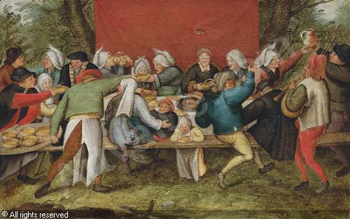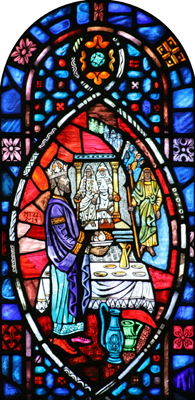What I Learned at the White House
The Parable of the Wedding Banquet
by Dan Clendenin
For Sunday October 12, 2014
Lectionary Readings (Revised Common Lectionary, Year A)
Exodus 32:1–14 or Isaiah 25:1–9
Psalm 106:1–6, 19–23 or Psalm 23
Philippians 4:1–9
Matthew 22:1–14
Fifteen years ago my family enjoyed a private tour of the White House. After skipping the long lines of summer tourists, we got a sneak peak of the Oval Office, the Rose Garden, some state rooms, and the Secretary of State's office. In the press room we took pictures behind the presidential podium — a regular tourist stunt. The kids remember the boxes of presidential M&Ms.
My sister had a similar experience when she was one of two people from her state to help decorate the White House for Christmas. We traded notes and agreed on two points.
First, no one in their right mind would refuse an invitation to the White House. Are you kidding?! Second, you feel giddy-nervous being there. You dress and act appropriately. You do what you're told. You don't mess around.
The gospel for this week reminded me of my few minutes at the White House.
14th-century Russian icon. |
There are seventeen parables in the gospel of Matthew. If you had to choose one that was the hardest to interpret, this week's Parable of the Wedding Banquet is a good candidate.
The story is full of violence. One interpreter calls some of the details "beyond comprehension." The narrative switches gears in the middle. The parable ends with a cryptic "saying."
To me these interpretive conundrums have the ring of truth. They sound like the outrageous things that Jesus said and did. He even said that he sometimes told parables to obscure the truth rather than to reveal it. Wow — try that in your next sermon and see how the congregation likes it.
Rome didn't execute Jesus for telling feel good stories. We shouldn't be shocked by a parable that shocks. "The parables of Christ," said Daniel Berrigan, "even the innocent, pastoral, tender, innocuous-seeming ones, conceal just below the surface a whiplash, a shock, a charge of dynamite. The stories set conventional expectations, whether concerning God, religion, politics, vocation, status and class, utterly off kilter."
The Parable of the Wedding Banquet is easy to over interpret, and when you do that you get lost in the weeds. There are three simple aspects to this story that are important for its interpretation.
First, this isn't just any banquet. It's not a back yard barbecue, it's the royal wedding of the king's son. Akin to the wedding of Prince Charles and Lady Diana in 1981. By one count, 750 million people watched it live on television.
Who in their right mind would refuse such an imperial invitation? And who would ever be the least bit presumptuous in such a setting? Nobody, that's who. Except for the people in this parable.
Second, Matthew conflates the parable of the Wedding Banquet with a second parable about a Badly Dressed Guest. This complicates the story a bit, and it's why the story suddenly changes gears in the middle.
Third, both parables end in catastrophe. This isn't a cute story that ends well. It's a shocking story that ends badly, and not once but twice.
There once was a king who prepared a royal banquet for his son's wedding. After the elaborate preparations were made, he sent out the invitations.
 |
Pieter Brueghel, 16th century painting. |
Then comes the first shock. Some people rejected the king's invitation. Jesus says that some people "refused to come." Others "paid no attention." Another group even killed the king's messengers. Such responses, said Jesus, showed that these people "did not deserve to come" (22:8).
Would you have refused an invitation to St. Paul's Cathedral in London for the royal wedding of Charles and Diana? Not a chance. But that's what happened in this parable. The people on the king's A-list refused his extravagant generosity. They spurned an invitation to the most prestigious party in town.
There's historical precedent for such erratic behavior. On October 30, 1918, King George V and Queen Mary summoned Colonel Thomas Edward Lawrence to Buckingham Palace. Lawrence was only thirty years old. He thought the meeting was to map out the new boundaries for the Arabs whom he had helped to liberate from the Ottoman Empire.
When he entered the palace ballroom, Lawrence saw the royal dignitaries, the costumed courtiers of medieval traditions, a small stool at the foot of the king's throne, and a velvet pillow on which there rested numerous medals. This was a rite of investiture.
Lawrence was to kneel on the stool while the king draped him with a sash, decorated him with medals, tapped him on the shoulder with a sword, and recited an ancient oath. All to make Lawrence a Knight Commander of the Order of the British Empire.
But instead of kneeling, Lawrence refused the honor. In almost 1,000 years of knighthood, nothing like this had ever happened. What should everyone do? A stunned King George and a furious Queen Mary watched as "Lawrence of Arabia" turned and walked out of Buckingham Palace. You could have pushed them over with a feather.
It's hard to believe, and it doesn't make any sense, but some people refuse royal generosity.
After a second round of messengers, a B-list of guests accept the king's invitation. If the privileged people refused his generosity, then he would extend it to "all the people his servants could find." So at long last the guest hall was full.
But one guest stood out like a sore thumb. He was a party crasher who dressed like a slob — to the wedding party of the king's son! In the royal palace! What was he thinking?! How could anyone be so cavalier? There's no cause for smug satisfaction by an "insider" at an imperial banquet. Rather, with privilege comes responsibilities.
Would I have gone to the White House in a dirty tee shirt? Never. You'd have to be crazy-clueless to do that. A more appropriate response would have been to buy some expensive clothes that I couldn't afford and would never wear again.
The people who refused the king's invitation didn't deserve to come. The guest who showed up inappropriately dressed didn't deserve to stay.
So, the first part of this parable describes the rejection of an invitation, and the last part an expulsion because of presumption. Both scenarios end badly. And Matthew describes both bad endings with similar language.
 |
Stained glass from Our Lady Queen of Apostles, Hamtramck. |
To those who refused his invitation, the king "sent his army and burned their city." Those who dressed inappropriately were "tied hand and foot, and thrown outside into the darkness." This is the figurative language of a fanciful story about some literal truths — truths that are meant to shock us into our spiritual senses.
Everyone without exception has received a free invitation to the kingdom of God. It's a banquet of excess and extravagance. John also compares it to a wedding party, one with copious amounts of the finest wine. But some people refuse God's generosity. It's hard to believe, but experience tells us it's true.
Other people try to enter the kingdom of God on their own terms and conditions. They want to write their own rule book. But life doesn't work that way, not in the world and not in the kingdom of God. No matter how hard you try, no matter what you think, you can't bend reality to your own wishes.
God's generosity is free for all, but it doesn't come cheap. It asks us for everything.
We read of similar dismal outcomes in the rest of the New Testament. There's shipwreck of faith, pseudo-apostles, scammers who preach for profit, legalists and libertines, seed that produces various crop yields, indistinguishable wheat and weeds that grow together, believers who sue each other, etc.
A merchant "sold everything" to buy the pearl of great price. The rich young ruler refused Jesus's invitation and "went away sad."
And so, said Jesus, in a rather melancholy conclusion, "many are invited, but few are chosen."
Note: The story about Lawrence is told in many places. I have followed the account in the excellent book by Scott Anderson, Lawrence in Arabia; War, Deceit, Imperial Folly, and the Making of the Middle East (New York: Doubleday, 2013), 577pp.
Image credits: (1) MetroBibleBlog; (2) ArtValue.com; and (3) MarysRosaries.com.





